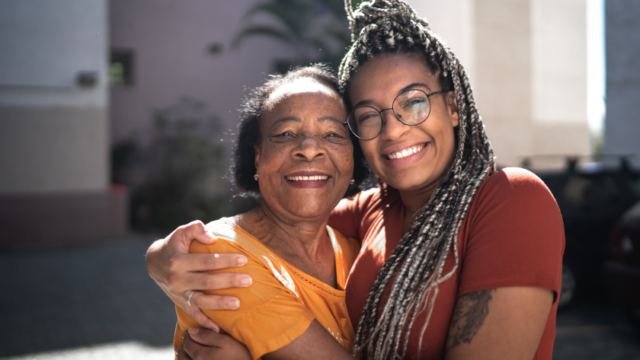Exemplary Programs
The Kinship Program – Adoptive and Foster Families of Maine, Inc.
Download This Resource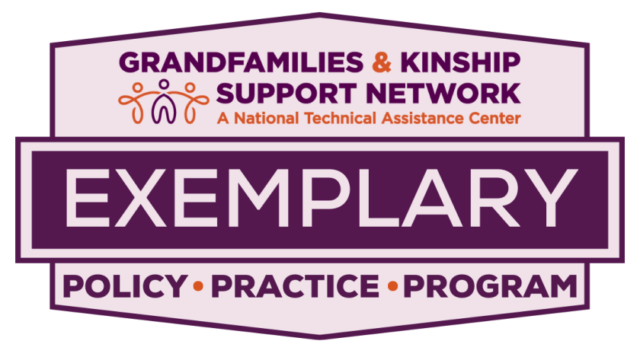
Adoptive and Foster Families of Maine, Inc. (AFFM) began in 1997 as a grassroots effort, with founding members who had experience as kin caregivers, foster parents, and professionals providing support to kinship families. The agency, which started in a one-room space supported by volunteers, has grown into an organization that is staffed by 26 individuals who have both professional and lived experience as resource families and serve hundreds of families across the state of Maine each year.
The Kinship Program at AFFM offers training, guidance, and resources to help kin caregivers, also known as grandfamily caregivers, provide safe and stable homes for the children in their care. Staff members have lived experience in and understand the unique needs of kinship families and the circumstances they face. They are skilled at navigating family dynamics and sharing ways to interact with children with trauma histories.
The Kinship Program consists of six key program elements: information and referral services; non-judgmental listening support; caregiver education; peer-to-peer support; urgent needs support, such as help accessing concrete goods; and cultivation of partnerships with kin caregiver organizations.
AFFM’s values and beliefs that underlie The Kinship Program include:
- Maine’s children have the right to be permanent members of a stable and healthy family.
- Kinship caregivers experience unique challenges when caring for a relative’s child.
- Kinship caregivers deserve the opportunity to add to their strengths through training, unconditional support, and access to services.
AFFM has been a strong advocate for kin caregivers since its formation. AFFM and its advocacy partners have been pivotal in getting legislation passed that formed a kinship advisory board and provided funding for kinship navigation services in Maine.
Eligibility for Services and Intake
The Kinship Program is designed to serve all kinship families, regardless of their child welfare involvement. Kinship specialists connect with families through self-referrals and referrals from faith-based organizations and community groups. Referring agencies are asked to assist families in filing a release of information form, the “permission to contact form.” AFFM does not charge kin caregivers for the services they receive.
Service Population
In 2023, The Kinship Program provided information and referral support to 721 kinship families. It serves families caring for babies, children, and young adults from birth to age 23. AFFM’s kin caregivers are typically grandparents but also include aunts, uncles, siblings, and non-relatives with a connection to the family. Extended family relationships in Maine’s tribal communities may include tribal clans, bands, and other members of a child’s tribal community.
Services
Information & Referrals
The Kinship Program provides information and referrals to help kin caregivers navigate various systems and access public benefits, legal services, mental and behavioral health services, and aging and disability support for themselves and their families.
Support Groups
AFFM offers support groups, also known as C.A.R.E.S. (Connect, Advice, Resources, Education, Support) throughout the state, both online and in person. At in-person groups, AFFM provides childcare. The childcare is a form of respite for caregivers and additionally offers the children an opportunity to connect with others in similar family situations. AFFM asks caregivers for input on topics for the support groups.
Emergency Financial Support
The Kinship Program provides emergency financial support to help cover the cost of utility bills, heating, food, car repairs, beds, and cribs. This support is offered in addition to referrals to financial benefit programs.
Legal Guide for Maine Kinship Families
In partnership with the Maine Volunteer Lawyers Project, AFFM developed a useful legal guide that helps kinship families understand the legal options available to them.
Resource Rooms
AFFM has several resource rooms at their two locations that are well-stocked with clothing, hygiene products, toys, and other items. If a family needs something that AFFM does not have, they will use their social media platforms, e-mail listserv, and community partners to try to acquire it. Needed items can also be posted on AFFM’s Swap Facebook page, where families can offer or request items.
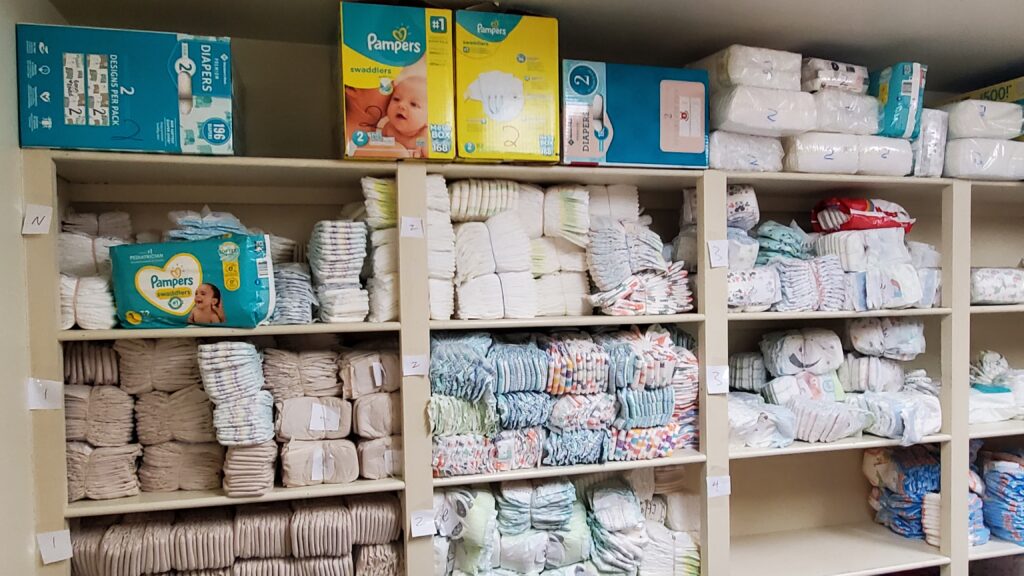
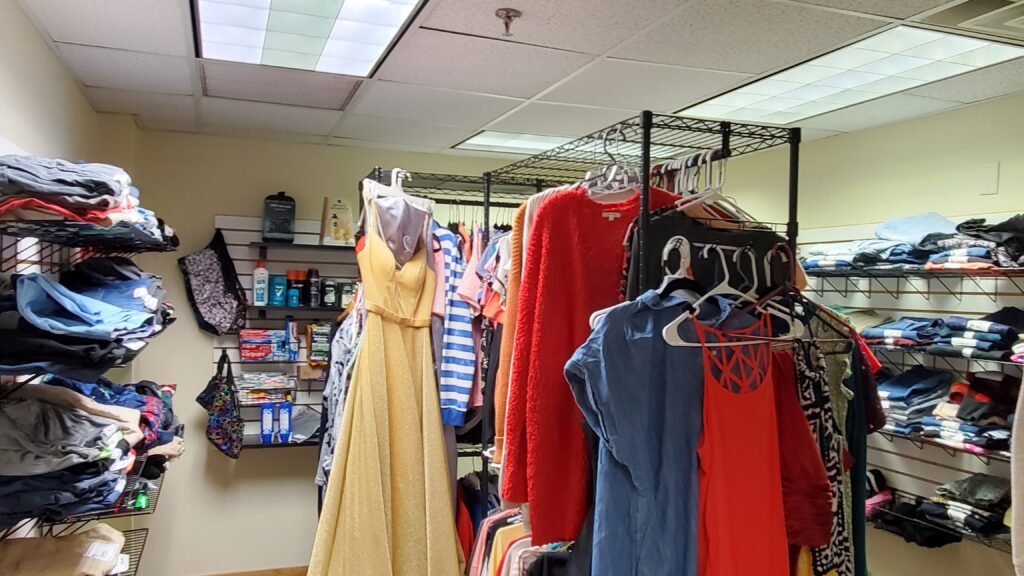
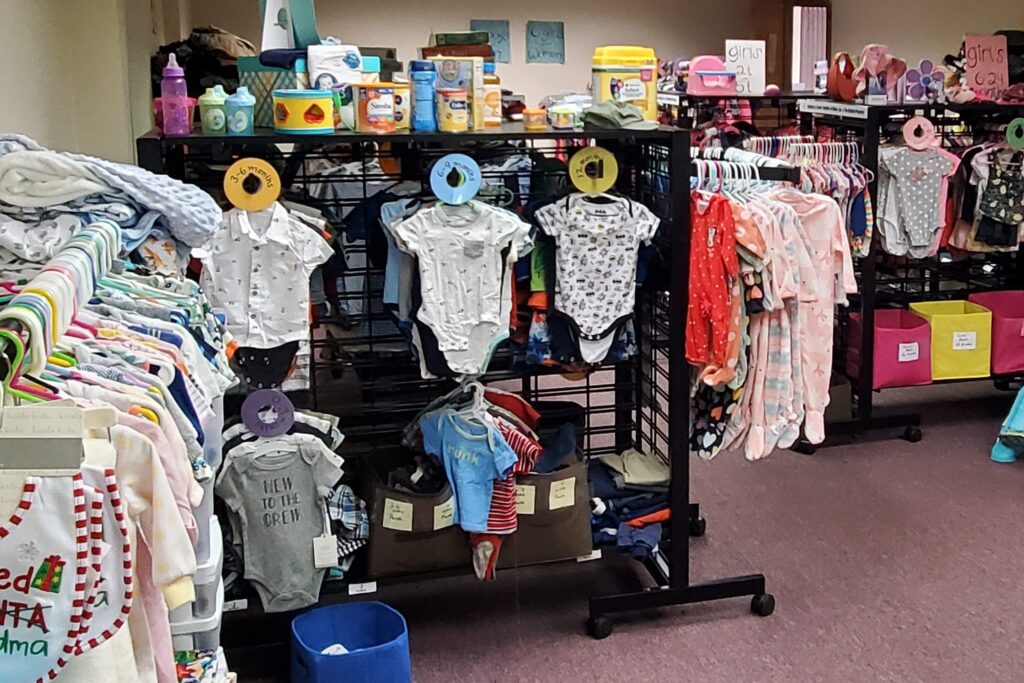
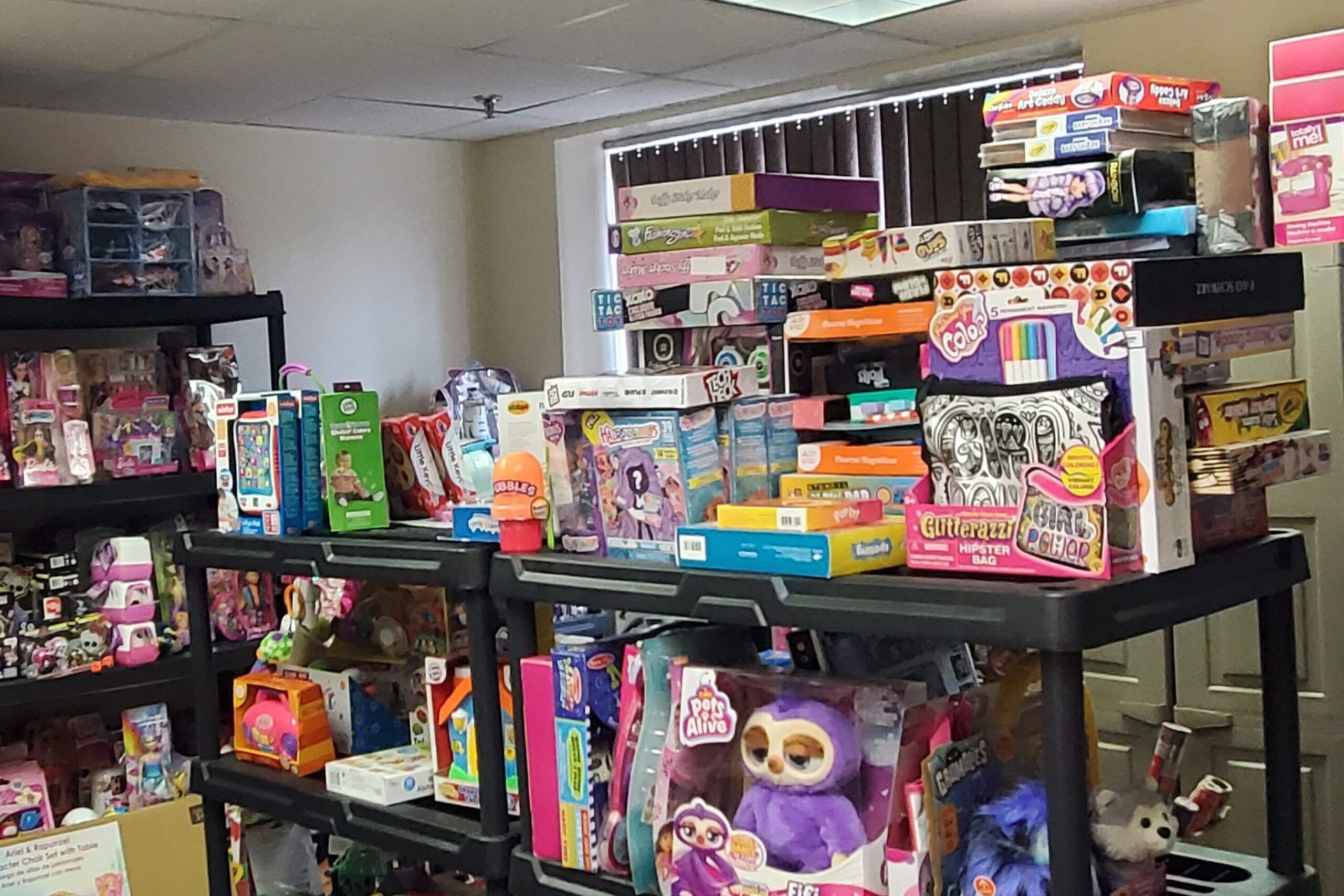
Comfort Cases
The Kinship Program provides new kinship families with a Comfort Case for the children in their care. The case includes new pajamas, a stuffed animal, a small blanket, a book, and age-appropriate hygiene products.
The Lending Library
AFFM offers an extensive library of educational books, videos, and resources on topics specific to kinship families.
Kinship Navigator Collaborative
In 2022, AFFM enrolled in the cross-site, multi-state Kinship Navigator Collaborative (KNC) with kinship navigator programs from the states of Montana and Wyoming. The collaborative, supported by Generations United, Casey Family Programs, and the University of Washington, is developing and implementing an “enhanced model” of kinship services. This kinship navigation model has a form of case management as its foundation and incorporates a pre-screening intake process, family needs assessment, family goal setting, and a hands-on approach to helping families access resources and attain self-established goals. This model is undergoing an evaluation that compares the enhanced kinship model with the program’s traditional information and referral services.
Staff
Staff members have both professional and personal experiences with kinship families. Those with personal experience are able to provide caregivers with peer-to-peer support, which caregivers value. AFFM’s executive director is very engaged with families and frequently extends himself on weekends to meet families’ needs. The kinship program manager, a cofounder of AFFM, is a grandparent raising a grandchild. She is a key member of the kinship team who mentors and supports the kinship navigators. AFFM employs a staff of five kinship navigators. Each is assigned to one of five districts across the state and is responsible for connecting families with information, supports, and services.
We understand that families don’t only need help from 9 to 5.
Staff Member
The hope they instill in us is empowering.
Kin Caregiver
Staff members have received training on the National Training and Development Curriculum and continue their education by attending national and state conferences and training sessions that focus on the strengths and needs of kin caregivers.
Key Partners
The building of supportive communities through local, state, and national partnerships is key to AFFM’s success. AFFM utilizes partnerships with public and private agencies, universities, foundations, trusts, and for-profit and nonprofit organizations to meet the diverse and changing needs of families. Partners include:
- Advocacy Groups – elevate the voices of kin caregivers and advocate for policy changes to better support kinship families. These include the Maine Child Welfare Action Network, the Maine Justice for Children Task Force, and the Maine Child Welfare Advisory Panel.
- Area Agencies on Aging (AAAs) – provide resources and in-home and community-based services.
- Department of Health and Human Services, Office of Child and Family Services (OCFS) – contracts with AFFM to provide peer support, peer mentoring, support groups, and training. AFFM and OCFS collaborate to develop policies and programs that best support all resource families across the state.
- Maine Volunteer Lawyers Project – recruits volunteer lawyers who provide free civil legal information, advice, and representation to low-income families.
- The Northern Lighthouse – a nonprofit mental health agency that provides case management services.
- University of Maine Center on Aging – provides consulting, data analysis, and quality improvement recommendations.
- University of Southern Maine’s Catherine Cutler Institute – collaborates with The Kinship Program to deliver the National Training and Development Curriculum to kin caregivers who are becoming licensed foster parents. This training is co-facilitated with a peer trainer from The Kinship Program.
Partners admire The Kinship Program for its accessibility, responsiveness, and vision for growth, as well as the trust placed in it by families. The partnerships are characterized by strong communication and engagement. Partners with varied expertise complement each other and meet the diverse and expansive needs of kinship families.
Caregiver Engagement
The Kinship Program was developed by kin caregivers who remain highly engaged in all facets of governance, program development, and implementation. Kin caregivers and others who have personal experience in kinship families are on the staff and the advisory board of The Kinship Program. Kin caregivers also volunteer as peer mentors and facilitate support groups. Kinship navigators provide caregivers with guidance on how to advocate for themselves and their families.
They ask us what topics we’d like included in our support groups and trainings.
Kin Caregiver
Outreach to Families
The state’s Office of Child and Family Services provides AFFM with a monthly listing of kinship families who have received placement of a relative’s child. AFFM then contacts the families on the list. Families that connect with AFFM receive a welcome packet that contains information about AFFM’s resources, services, and support. The Kinship Program distributes flyers to probate courts, pediatricians’ offices, and other community partners. The staff collaborates with school administrators and educators to inform them about the existence and prevalence of kinship families within their school systems. The Kinship Program is listed on 2-1-1 Maine and uses Facebook and Instagram to reach families. The most frequent way individuals learn about AFFM is by word of mouth.
Funding and Sustainability
AFFM is funded in part by a contract with the Maine Department of Health and Human Services. State legislation in 2022 allocated funds specifically for kinship navigation services. Private funders, such as the John T. Gorman Foundation and Brookdale Foundation, provide funds that allow The Kinship Program to offer emergency financial assistance to families. Donations from faith-based and other community-based programs, private businesses, and community members help meet the needs of kinship families. The Kinship Program also uses social media to fundraise. AFFM continues to seek and secure public and private grants to fund specific programs and continues to seek financial donations.
Demonstrating Success and Continuing Quality Improvement
Kin caregivers receive a quarterly satisfaction survey, the results of which are used to measure success and inform program modifications and improvement. In a recent survey, 81% of respondents believed that the services provided by The Kinship Program supported their caregiver experience. Additionally, 90% of respondents (about 258 caregivers) indicated that the services provided by the program helped them keep a safe and stable environment for the youth in their care. The program also conducts exit surveys of licensed kin caregivers who chose not to renew their license, and that information is incorporated in the feedback analysis.
Participation in the statewide Kinship Navigator Advisory Committee provides opportunities to gather qualitative data from caregivers and other stakeholders that informs continuous quality improvement practices. The Kinship Program has expanded data collection and implemented an outcome evaluation based on the new, enhanced kinship model, developed by the Kinship Navigator Collaborative. The Kinship Program engages the University of Maine Center on Aging to evaluate the program and survey families who are receiving kinship navigation services. AFFM plans to submit The Kinship Program to the Title IV-E Prevention Services Clearinghouse in 2026.
Challenges and Areas for Program Improvement and Growth
The kinship staff has relayed that potential kin caregivers identified by the child welfare system need guidance from the onset of child protective involvement. The kinship staff has expressed that caregivers would be more successful if they were connected to The Kinship Program when the child first enters their home so they can access concrete goods and other resources. Additionally, there is an opportunity to increase awareness of The Kinship Program amongst the general public and caregivers outside of the child welfare system who are caring for a relative’s child.
Due to the size of the state, it is sometimes difficult for families to access the myriad of resources offered at The Kinship Program’s two office locations. Although AFFM mails or delivers goods to families that cannot visit the offices in person, staff would like to explore the feasibility of securing additional resource rooms throughout the state.
The Kinship Program has dedicated staff in its two locations. Continued efforts to recruit and support volunteers in local communities throughout Maine are important to maintaining program impact and to minimizing burnout.
Maine is a state with few private foundations, so diversifying funding is especially important. Nurturing relationships with individual donors, as well as with both small and large organizations, is critical to financial sustainability.
Lessons Learned
The Kinship Program has learned that ongoing self-examination is important. Being open to change and adapting programs and services to meet a wide range of family needs is necessary for success. Growth means doing things differently as the program expands. Leaders who were traditionally engaged on a day-to-day basis with families now need to allocate more of their time toward fundraising, administration, and nurturing external partnerships. Program staff have learned how to focus on what they do best, and to work collaboratively with external partners to expand services.
Additional Program Resources
Learn More about the Network’s Exemplary Designation
Network staff, along with staff of a partner organization, participated in a site visit to this program and are available to answer questions based on this summary. Please complete this short form and we will get back to you.
For information about the steps and criteria of the exemplary designation process, please click here.
